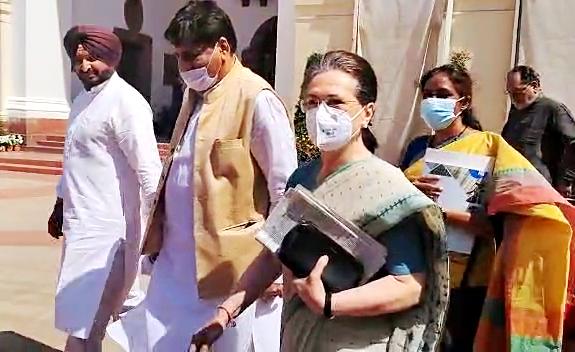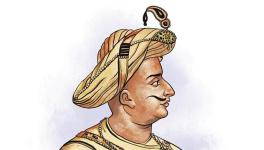Can Congress Party Build on UPA-I Proposals to Script its Revival?

Congress Interim President Sonia Gandhi leaves after meeting MPs from Punjab
After the Congress Working Committee meeting called by party president Sonia Gandhi, the presidents of Congress unites in all five states where elections were just held have resigned. A major organisational reshuffle is expected in the coming days. This kind of surgery isn’t new. It has been a regular feature of the Congress party in the last six or seven years. But the condition of the patient has only worsened after each incision. In the just-concluded elections in Uttar Pradesh, Uttarakhand, Punjab, Manipur and Goa, the Congress’s performance dipped far below disappointing to hit collapse.
Punjab was a feather in the cap for the party, but it has slipped away. It also lost badly in Uttarakhand, Uttar Pradesh, Goa and Manipur. The rivals of the Congress—and some friends—are back to criticising its leadership and ridiculing it. G-23, the group of dissatisfied Congress party leaders, has become active again, although now it has fewer members. While Jitin Prasada has joined the Bharatiya Janata Party, Veerappa Moily and Mukul Wasnik have distanced themselves from the grouping. Another member of this faction, Kapil Sibal, has openly demanded that the members of the Nehru-Gandhi family—Sonia, Priyanka and Rahul Gandhi—should relinquish charge of the party to someone else. Some Congress leaders reacted sharply to this.
All the G-23 leaders, including Ghulam Nabi Azad, Anand Sharma and Manish Tiwari, were ministers when the Congress was in power and its long-time members. But the stakes are tremendous for ordinary people too. Those who repose faith in secularism, democracy and coexistence are anxious about the condition of the Congress. They fear that if the country’s largest opposition party does not script a comeback, even if all regional parties unite for the 2024 national election, they will fail to take on the BJP and Sangh Parivar.
The present circumstances are such that the Congress and other Opposition parties are necessary for each other. One is the biggest party with a national footprint, but it must also come to a point where it can bear the responsibility to bring all different like-minded political outfits to a mutual understanding and form a united strategy. Saving secularism, democracy, the Constitution and the social fabric of the country is the larger goal. However, the United Progressive Alliance or UPA clan is not just divided but also shrunken compared to the BJP-led National Democratic Alliance.
Obviously, the Congress can raise the number of its allies only if it stands firmly on its own politically. All prominent leaders of the party say it can garner political success only if it strengthens its ideology. The organisation will have to be tidied up to establish a dialogue with the general public. Party stalwarts have concluded that some new methods will also have to be adopted to compete with the ruling party. Soon the party will hold its “Chintan Shivir”, in which leaders and strategists will chalk out a future strategy. This meeting will include discussions of other issues, including the ideology and organisational strengthening, and ways to break the impasse caused by widespread communal polarisation. The other topic will be alliances for the next general election. It is noteworthy that in 2003, the Congress party had abandoned its “ekla-chalo” policy after the Chintan Shivir held in Shimla. It adopted the path of alliances because the NDA had come to power at the Center by striking strategic political alliances.
At the time of the Shimla meeting, Left leaders, including Harkishan Singh Surjeet and Sitaram Yechury, had played an essential role in uniting the secular parties under the UPA banner. Sonia Gandhi was the first to meet her neighbour, the late. Ram Vilas Paswan, walking to his home. The blueprint for the initiative was prepared at Surjeet’s Teen Murti Lane residence. The way the BJP is aggressively marketing “vikas” at present echoes the Shining India campaign of those days. The latter flopped at the polls, not least because there was a strident critique of the campaign from the Opposition group. Once the Congress party and its allies presented an economic model to empower the general public, the dice rolled away from the NDA camp and fell in the UPA’s favour. It defeated the NDA in the general election. Then, it had formulated schemes such as MG-NREGS and offered other public-interest policies. They came under the umbrella formulation of a Common Minimum Program. Today, the challenges are even more severe and complex than earlier. The Congress will have to prepare itself afresh to face such times.
The important development of the last week is that the party leadership seems to be serious about reaffirming itself ideologically. There appears to be a realisation that without clarity on its position—among leaders and workers—it will be challenging to arrive at an arrangement with other Opposition parties.
Rahul Gandhi has clearly said that the Congress party is secular and believes in bringing all sections of society together. He has gone so far as to say that anyone in his outfit who fears the RSS should leave. For several years, whenever the top leadership of the Congress has raised an issue, its prominent leaders did not support it. The “Rafale scam” strategy is a notable instance of how Rahul was left stranded and alone in the party. Another recent instance is Rahul’s recent attempts to spark a debate on “Hindu vs Hindutva”. All the leaders of his party started trying to suppress the discussion. They believe raising such issues runs the risk of falling into a trap of the BJP-RSS, while Rahul, Ashok Gehlot, Mallikarjun Kharge and some other significant Congressmen believe the electoral battle is incomplete without an accelerated and assertive ideological war. Indian democracy has weakened, and event after event shows its social fabric disintegrating in full public view. In the recent elections, any paramount concern of citizens, be it inflation, unemployment or poverty, was trampled by the bulldozer of slogans such as “assi vs bees [eighty versus twenty]”. Every week, an emotional issue is stoked, and pro-government media outlets fan it as if it were the only concerns that matter. Their aggressive coverage diverts the attention of the public from honest questions.
There is no doubt that the crushing defeat in five states has shaken the Congress. There is deep despair among its workers on the ground, but the party leadership seems to be prepared to deal with these situations vigorously. From Sonia Gandhi to Rahul and Priyanka, everyone seems busy in meetings. On the second day of the CWC meet, Priyanka spoke with the Uttar Pradesh state unit for a long time. She told them she had started preparations for the upcoming Lok Sabha elections.
The author is a freelance journalist. The views are personal
Get the latest reports & analysis with people's perspective on Protests, movements & deep analytical videos, discussions of the current affairs in your Telegram app. Subscribe to NewsClick's Telegram channel & get Real-Time updates on stories, as they get published on our website.























